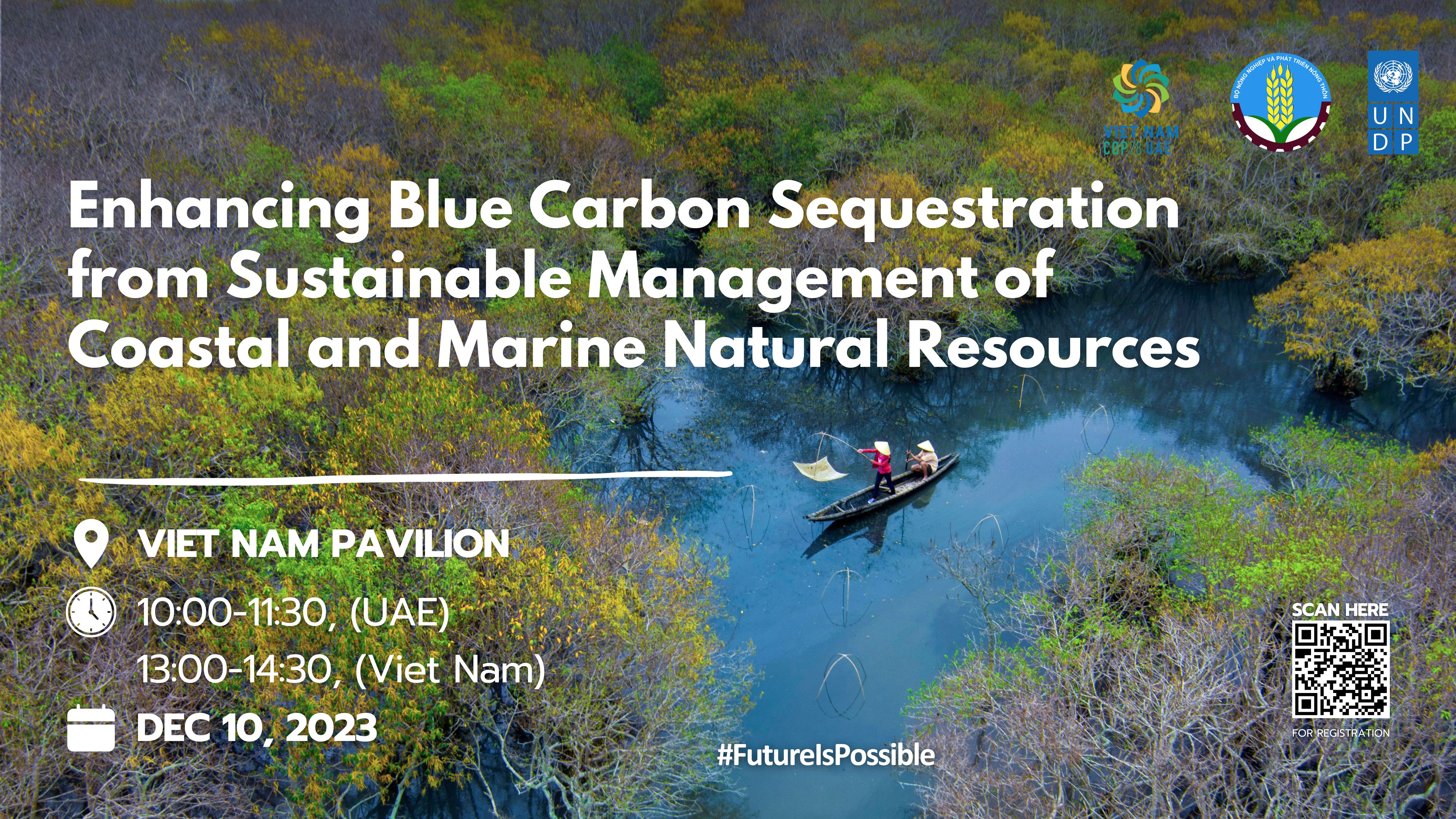Viet Nam and UNDP Convene Global Experts to Discuss Insights on Enhancing Blue Carbon Sequestration and Sustainable Coastal Management
December 11, 2023

Dubai, 10 December 2023 - The Ministry of Agriculture and Rural Development (MARD) of Viet Nam and the United Nations Development Programme (UNDP) organized a workshop entitled "Enhancing Blue Carbon Sequestration from Sustainable Management of Coastal and Marine Natural Resources." This COP 28 side event convened global leaders and environmental experts to share knowledge and experiences in climate change mitigation and sustainable economic development, recommend strategies for enhancing blue carbon sequestration, and discuss the aquaculture supply chain's carbon footprint traceability and solutions for marine resources and agricultural development.
The ocean sustains approximately three billion people, particularly in developing countries, and contributes a critical role to the global economy and employment. It also absorbs substantial anthropogenic carbon dioxide emissions, playing a vital role in climate change mitigation. Marine ecosystems such as mangrove forests, salt marshes, and seagrass meadows, critical in storing blue carbon, are crucial for long-term climate action.
Viet Nam, along with over 70 other countries, recognize the importance of mangrove forests in the climate action plans, and have committed to protecting these vital ecosystems. To assure sustainability of this vital asset, Viet Nam, therefore, must go beyond pledges and translate its commitments into on-the-ground initiatives that protect, restore, and sustainably manage coastal ecosystems. This requires collaboration and concerted effort from governments, non-governmental organizations, local communities, and the private sector. However, the country faces challenges in managing these ecosystems due to inadequate knowledge and monitoring systems, rapid coastal development, and pollution impacts. Additionally, strengthening community engagement and ensuring equitable benefits in ecosystem management is imperative.
Several keynote speakers, such as Mr. Pham Quang Huy, Counsellor for Agricultural Affairs at the Embassy of Viet Nam in the United States, highlighted the importance of blue ecosystems to Viet Nam. With a coastline that spans over 3,000 kilometers, he stressed that Viet Nam’s coastline serves as a crucial source of marine resources, contributing to its economic prosperity, cultural heritage, and delicate ecological balance.
Ms. Kimberly Todd, Global Technical Specialist-Climate and Forests, UNDP underscored the ocean's immense value to human life and its role in climate mitigation and adaptation. In so doing, Ms. Todd reaffirmed UNDP’s commitment to supporting initiatives to develop and enhance information for a comprehensive blue carbon accounting framework in developing countries, including Viet Nam.
Ms. Todd presented a comprehensive checklist to enable effective Nationally Determined Contribution (NDC) implementation in the land sector (including mangroves) in line with long-term climate goals that require (1) Cross-sectoral coordination among government agencies with mandates over mangroves, (2) Harmonizing data collection, methodologies and monitoring across climate, biodiversity, and coastal entities, (3) in community participation throughout conservation and restoration initiatives, (4) Improving legal frameworks to generate incentives and limit illegal conversion, and (5) Leveraging financial incentives from carbon-markets and sustainable value chains.
Other keynote speakers highlighted the critical link between mangrove protection and rehabilitation with immense benefits not only for coastal communities but national and global economies. These benefits extend beyond environment and climate mitigation, underlining the urgency of mainstreaming blue carbon into national and international climate policies. Dr. Daniel Murdiyarso, Principal Scientist of CIFOR-ICRAF drew upon his extensive experience in Viet Nam to explain the dual roles of mangrove blue carbon ecosystems in tackling climate change. Dr. Murdiyarso echoed Ms. Todd’s call, stressing “mainstreaming mangrove blue carbon in the national strategies through NDC is urgently needed.”
Ms. Erna Ika Rahayu, Deputy Director for Cooperation at Indonesia’s Peatland and Mangrove Restoration Agency, discussed the country's extensive mangrove coverage and ambitious rehabilitation targets and emphasized the need to involve a wide range of stakeholders, particularly local communities: “Mangrove rehabilitation is beyond planting trees. We need to promote the full range of benefits mangrove offer, including both non-timber forest products and environmental services, to improve local economies.”
A representative of Viet Nam’s Department of Forestry, Ms. Nghiem Phuong Thuy, reported the country’s progress in implementing the Scheme on “Protection and development of coastal forests in response to climate change and promotion of green growth in the 2021-2030 period”. This progress, in accordance with the Prime Minister’s Decision No. 1662/QD-TT has led to the approval of several technical guidelines and standards on mangrove plantation and rehabilitation, and planting of over 6,000 hectares of mangroves and 300,000 scattered trees between 2021-2022.
Dr. Cao Le Quyen, Deputy Director General at the Viet Nam Institute for Fisheries Economics and Planning (VIFEP), shared experiences in mapping carbon footprints of nature-based shrimp commodities in the Mekong Delta. The research provided promising evidence that integrated shrimp-rice and shrimp-mangrove farming systems offer significant potential for blue carbon transformation, offering a substantial reduction in greenhouse gas (GHG) emissions reduction from shrimp production compared to other shrimp farming practices.
The event concluded with a unified call to action for governments, the public, the private sector, and international organizations to collaborate towards implementing policies that prioritize the conservation of blue carbon and promote sustainable ocean-based economies. The hosts stressed preserving and restoring the health of mangrove forests, seagrasses, and salt marshes strengthens contributions to carbon sequestration and bolsters the resilience of communities and ecosystems against rising sea levels and extreme weather events.
This event was a powerful reminder of the importance of collective action and sustainable practices in preserving marine ecosystems. The discussions set the stage for future initiatives to safeguard our oceans, emphasizing the crucial role these decisions play in our planet's and future generations' health.

 Locations
Locations



